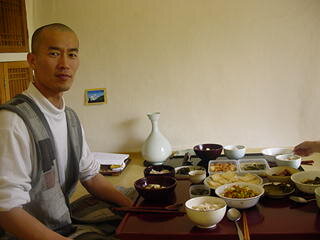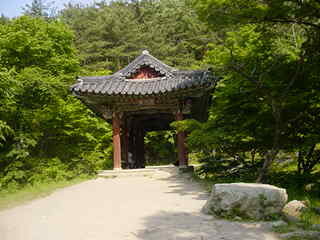Yesterday, I sent the first of three installments of a very impactful story I wanted to share with you. Today is the second installment. I hope you'll enjoy it.
Before we get into the story, I wanted to let you know that I had the privilege of being featured on the Yeah Podcast. In this episode, we talk about how I share yoga, Yoga Nidra, and mindfulness on digital platforms like Zoom. It's fun, funny, and interesting. I hope you'll listen and subscribe to this great podcast.
READ YESTERDAY’S POST FOR THE FIRST PART OF THIS STORY
Hey-am suggested we hike the half mile to visit Tog-hyon, the monk at the hermitage temple. The sun was well up by now and we hiked through the bamboo forest. We got lost but eventually found our way to the mountain dwelling. I felt as though I was walking through the peaceful folk dwelling in the movie Dreams by Akira Kurosawa. I saw that the monk living at the hermitage was completely self-contained. His plot had a well, an outdoor toilet, a private temple in a small wooden building the same size as his two-room house. I could tell by the details and obviously careful construction this was built by the monks themselves. We called out and knocked at his door but nobody was home so we decided to wait.Hey-am suggested we hike the half mile to visit Tog-hyon, the monk at the hermitage temple. The sun was well up by now and we hiked through the bamboo forest. We got lost but eventually found our way to the mountain dwelling. I felt as though I was walking through the peaceful folk dwelling in the movie Dreams by Akira Kurosawa. I saw that the monk living at the hermitage was completely self-contained. His plot had a well, an outdoor toilet, a private temple in a small wooden building the same size as his two-room house. I could tell by the details and obviously careful construction this was built by the monks themselves. Jin-soon and I sat and talked and enjoyed the morning sun.
Jin-soon and I had been sitting outside talking and enjoying the warm morning sun for about a half hour when Tog-hyon emerged from the forest. He was carrying a walking stick and wearing a Buddhist-chic patchwork vest, baggy, gray monks pants that tightened around the ankles with knots for buttons, and a large straw hat. He greeted us with a large smile and bow and before even bothering to learn our names, he invited us for tea and lunch. He spoke to me in rusty yet precise English. During tea he said that he'd learned English in law school before he became a monk, fifteen years ago.
We sat down on the floor as he prepared the tea. Eager to begin conversation, I mentioned that it was very peaceful there at his hermitage, and without my knowing it, my lessons had begun. "Why do you say that it is peaceful here?" he inquired with that sage smile of his. "I fumbled for something to say, sensing I had made a faux pas. "The peace we have can only come from within. Otherwise, it will always leave us," he asserted. "We are doomed for sadness if we base our happiness on things that are constantly changing." He stared deeply into my eyes.
Lunch was served. It was sticky rice mixed with the occasional yellow millet grain. It was two kinds of kimchi. It was assorted stringy vegetables. It was fried tofu squares. It was marinated mushrooms. It was a bowl of assorted assorted vegetables cooked with tofu. It was exquisite, even better than dinner the night before. Again I found myself chewing slowly and twirling my chopsticks in ultimate gastronomical ecstasy. Tog-hyon asked me, "Do you like Korean food?" "Um, yeah!"
Almost jokingly, I asked the monk if he liked American food. "I love Dunkin Donuts," he said matter-of-factly while simultaneously and miraculously producing a small box of powdered, jelly-filled Dunkin Donuts from a nearby cupboard. I stared in astonishment as he gave us each a donut. I may eat another Dunkin Donut in my life, but never one served on the proverbial silver platter of a zen monk in hermitage at one of the most revered monasteries in the world.
After lunch Jin-soon offered to do the dishes and I just before I jumped in to help, Tog-hyun looked me straight in the eyes and asked me if I would go on a walk with him. Whatever Tog-hyun was going to share with me, I felt bad that Jin-soon was going to miss it because of her offer to wash dishes. But it was just he and I.
Outside his little house, he began walking and met a thin, worn path. He quietly walked along the path through the serene bamboo forest. I followed on his heels. Instinctively, I began to do the museum walk, hands clasped behind my back. I do this when I don't want to disturb the priceless beauty and art around me. Again, I could feel myself having a once-in-a-lifetime moment.
We walked for a few minutes through the forest until we came to a bamboo barrier laying across the path obstructing the way. It was obviously constructed by him. There was a sign on the post written in neat Korean. He pointed to it and said, "This says, that this place is not for just anyone, but you're not just anyone," and lifted up the barrier for me to pass.
After another 10–15 minutes of walking down the mountain path, we came to a small building which overlooked a vast valley of pine trees below. The building was a meditation sanctuary, a large wooden deck covered with a curved, tiled roof. "I built this with three other monks. We had a very difficult time," he said laughing.
"Let's meditate."
He offered me the only mat on the porch and we both sat down, crossed-legged, and stared out into a vast, unspoiled mountain vista. West. Again, my meditation was deep and peaceful. My eyes were open. "What is this spirit inside me?" I thought. I became very peaceful. I stared at a lone pine tree in the distance. It was different than those surrounding it, a dark-green tree in an ocean of lightly colored spring-green trees. I felt as if somehow that tree was me.
After 20–30 minutes of meditating, Tog-hyun said, "Do you hear the wind blowing through the pines? There's an old Zen poem that says, 'What is the price of the wind blowing through the pines?'. So I ask you …" “Damn!” I thought, “Here comes another impossible question!” … "what is the price of the wind blowing through the pines?" Nervous, I rattled off some light-weight answer to the effect of, "The wind, the trees, they are part of us all—part of our soul. Our soul is priceless, it’s, um … yeah, the pines.
"You don't understand me, do you?" he asserted. "I don't understand," I cowed in agreement. "You studied English in university, and you don't understand?" kindly goading me with a warm smile that put me at ease. "Stop thinking about it,” he admonished. “You can't use theories to answer the question. You can't use language. You must doubt. You must continually ask 'the question', (who am I) and one day you will learn. It will take three days of constant meditation. Even while you are resting, your mind must be pondering the question of the price of the wind through the trees. Someday you will know. Let the blade of doubt cut through the blackness of the mind. Let's go back."
And with that, we stood up and he led us back to his house. He entered his house and this time he opened the wooden shutters to the only window in the room. It opened to the West and made me sit directly to his left, facing the window. "He's so young and makes many mistakes,” he pronounced to Jin-soon and another woman who had arrived in our absence, “but he is very spiritually minded. I can see that."
Just before entering the temple the day before, I had purchased a hand-carved bracelet which consisted of a circle of small skulls. Tog-hyun noticed it on my wrist and pointed at it asking, "What do you think that means?" Prior to buying the bracelet, Jin-soon and I discussed how the bracelet represented impermanence, how we are all a circle of beings, interwoven together, but are all impermanent here on earth. Though I feared that Tog-hyun would again use my reasoning as a latrine, I nonetheless had nothing else to say. All attention was on me. I paused for a second then repeated to him exactly what Jin-soon and I discussed. "Really? Very good!," he exclaimed.
Phew!
More tea.
It was time to go; we'd spent almost five hours with Tog-hyun. Before going, I told him that I'd be going home to family and friends in America and asked him if there was a message of wisdom that he would like to send with me that I could share with others. He told me that a message from him isn't necessary. Instead, I must find the message within my own self and share it. I guess I should have learned that lesson by then.
My new teacher again pointed at my bracelet and asked again, "What is that?" Considering my sketchy track record to his questions, and wondering why he was asking me again, this time I remained silent. I think that was the correct answer. Tog-hyun didn't probe further. He seemed content. Before leaving, Tog-hyun reached into a closet and gave me a very expensive box of tea. As he walked us to the edge of the hermitage he read the Chinese inscription on the box. "It says, 'Zen and the taste of tea is the same’." Then without a segue looked me directly in the eyes, seemed to grab by soul, and said, "Continue to doubt. Always doubt." And with that we bowed humbly to him, and left.
It was late. We hiked back to the temple grounds, stopped by the Great Hall one more time to make our final bows, grabbed our bags and took the first bus out. On the nearly 5-hour trip home, I sat quiet, staring out the window and thought about Tog-hyun's words.
Stay tuned tomorrow for the last installment of this story!





